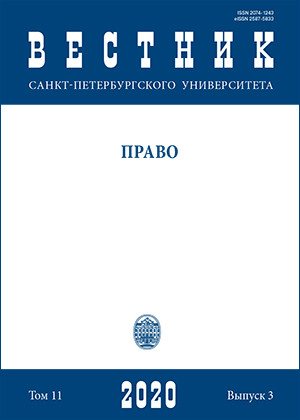Legal status peculiarities of the court chairman in Russia and in foreign countries: Comparative and legal analysis
DOI:
https://doi.org/10.21638/spbu14.2020.314Abstract
A comparative analysis of the legal status of the court chairman in Russia and in foreign countries is provided in the article. It is shown that the legal status of the court chairman is derived from the content and forms of implementation of the principle of the court and judges’ independence. The basic elements of the court chairman’s legal status, such as the procedure of appointment to the post, tenure of the post, tenure age limit, as well as the special powers related to the implementation of the leading function in the court, are disclosed. The notion that the globalization of legal processes leads to the unification of the requirements for the acquisition and termination procedures of the legal status not only of judges, but also of court chairman is discussed. The article reveals general and special approaches in the legislation of different countries to such requirements applied to the candidates for the post of court chairman, such as knowledge of case management, organizational skills, standards for themselves and court officials, the ability to quickly and qualitatively introduce new technologies into the work of the court, and maintaining a high level of qualification. The possibilities to develop a unified scientifically based approach to establishing the derivatives of the court chairman’s legal status in order to avoid the arbitrariness of establishing legislative provisions in different countries are revealed. The article concludes that a court chairman’s ensured independence of particular court would significantly increase the level of public trust not only in the court, but also to the state in general. However, this topic requires further research.
Keywords:
legal status, judicial system, court, independence of the court, court chairman, bodies of the judicial community, judicial ethics
Downloads
References
Downloads
Published
How to Cite
Issue
Section
License
Articles of "Vestnik of Saint Petersburg University. Law" are open access distributed under the terms of the License Agreement with Saint Petersburg State University, which permits to the authors unrestricted distribution and self-archiving free of charge.






